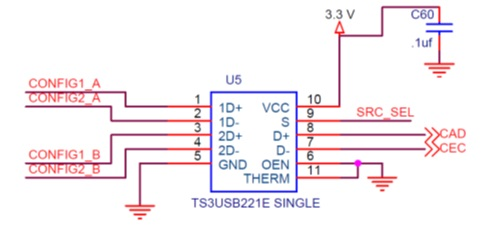SLAS907C December 2015 – December 2020 HD3SS214
PRODUCTION DATA
- 1 Features
- 2 Applications
- 3 Description
- 4 Revision History
- 5 Pin Configuration and Functions
- 6 Specifications
- 7 Detailed Description
- 8 Application and Implementation
- 9 Power Supply Recommendations
- 10Layout
- 11Device and Documentation Support
- 12Mechanical, Packaging, and Orderable Information
Package Options
Mechanical Data (Package|Pins)
- ZXH|50
Thermal pad, mechanical data (Package|Pins)
Orderable Information
8.2.4.2.2 CONFIG1 and CONFIG2 Routing
The HD3SS214 only routes the high speed main link, AUX, and Hot Plug Detect (HPD) lines, which means CONFIG1 and CONFIG2 lines need to be routed externally. This is necessary because these lines are important for DP++ as CONFIG1 carries the CAD signal.
A Texas Instruments TS3USB221 (SCDS263) is used to route these signals. It is a 2:1/1:2 USB switch that operates similarly to the HD3SS214. Each port has two inputs, so it is ideal for the CONFIG signals. SRC_SEL is used to select which source the CONFIG signals are from. The circuit for routing these signals can be seen in Figure 8-5.
 Figure 8-5 CONFIG Signal Routing
Figure 8-5 CONFIG Signal Routing